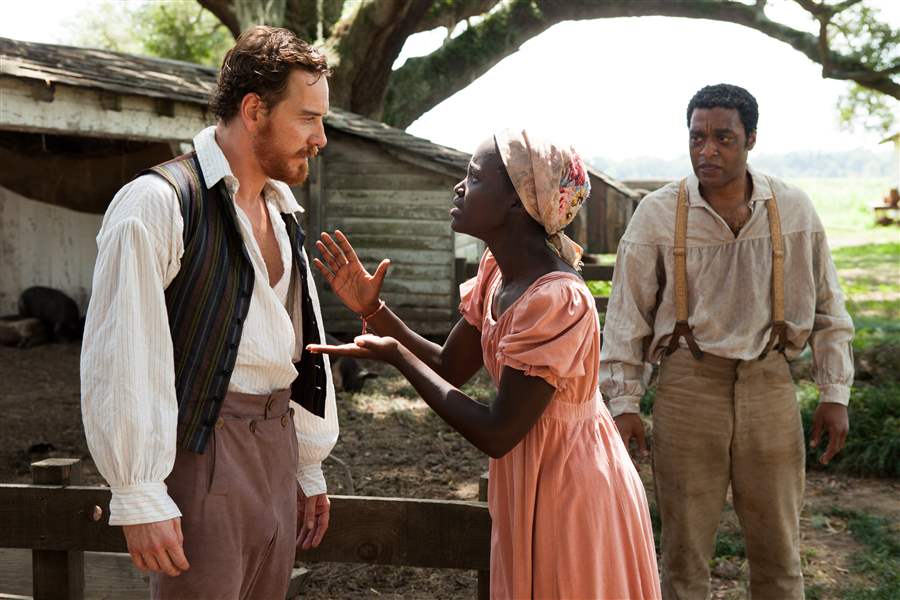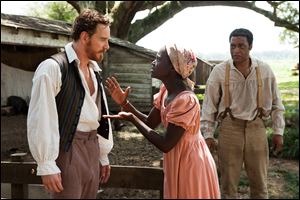
MOVIE REVIEWS
A savage telling
‘12 Years a Slave’ a stunning, brutal true story — an Oscar front-runner.
11/8/2013
This image released by Fox Searchlight shows Michael Fassbender, left, Lupita Nyong'o and Chiwetel Ejiofor, right, in a scene from "12 Years A Slave."
ASSOCIATED PRESS

This image released by Fox Searchlight shows Michael Fassbender, left, Lupita Nyong'o and Chiwetel Ejiofor, right, in a scene from "12 Years A Slave."

This image released by Fox Searchlight shows Benedict Cumberbatch, left, and Chiwetel Ejiofor in a scene from "12 Years A Slave."
It’s true that the Oscar race is all but over. This movie awards season will belong to 12 Years a Slave.
The stunning and tragic true story of a free black man sold into slavery in the pre-Civil War South, 12 Years a Slave is guttural, raw, and necessary to the moment, the kind of film that merits critical accolades and industry trophies.
Despite a few flaws, the film is bulletproof, artistry of visceral impact more than technical success.
Written by John Ridley and based on Solomon Northup’s 1853 autobiography, 12 Years a Slave begins in the happier moments of the author’s life, as a loving husband and father of two in upstate New York.
Directed by Steve McQueen.
Screenplay by John Ridley, based on the autobiography.
A Fox Searchlight release, playing at Cinemark Franklin Park and Levis Commons.
Rated R for violence, cruelty, some nudity, and brief sexuality.
Running time: 132 minutes.
Critic’s Rating ★★★★★
Cast: Chiwetel Ejiofor, Michael Fassbender, Lupita Nyong’o, Paul Dano, Paul Giamatti, Benedict Cumberbatch, Alfre Woodard, Brad Pitt
★★★★★ Outstanding; ★★★★ Very Good; ★★★ Good; ★★ Fair; ★ Poor
Days later the well-read, well-spoken, and talented violinist is drugged and sold into slavery by two white con men posing as traveling circus performers while his family is away on a trip. It’s a hellish nightmare come true.
The unimaginable odyssey of Solomon (Chiwetel Ejiofor) begins in a dark jail cell, where his protests of being a free man are met with beatings, then aboard a slave boat, where he is shackled with other kidnapped black men and women being shipped to the South. And it ends with him in the custody of a vicious Louisiana plantation owner named Edwin Epps (Michael Fassbender), where he is finally rescued more than a decade after his ordeal and restored to the arms of his loving family.
In the long years between those moments, Solomon experiences the savage cruelty of Christian white men and women — Bible-quoting slave owners whose dehumanizing views of blacks as animals is necessary to reconcile their despicable deeds with their religious faith.
Solomon watches others perish at the hands of these butchers, and he bears the scars on his back of their repeated whippings. His initial instinct is to fight back but he learns from his own pain and blood that to survive he must repress his rage and do as he is commanded.
Solomon also is stained with the blood of fellow slaves, by his own actions and inaction.
When a tortured slave named Patsey (Lupita Nyong’o) begs Solomon to drown her and end her misery of beatings and punishment, he refuses, which makes the consequences of his decision all the more troubling and excruciating to watch.
Solomon is a stoic hero who possesses contradictions and unflagging resolution. Ejiofor (Children of Men, American Gangster) explores the rich substance of the character and delivers a tour-de-force performance that never stoops for easy empathy, but forces us to look into his eyes to see the pain. As Solomon stands alone, nearly broken by the length and weight of his circumstances, director Steve McQueen holds the camera close to Ejiofor's face for a minute or longer as the actor stares squarely at us, breaking the barrier between audience and film. There are no tears or anguished cries, just intense silence. It's an uncomfortable and effective moment that challenges us to peer deep within ourselves.
Equally mannered in his performance is Fassbender, reining in a villainous role that could have spiraled into cartoonish levels of vile behavior. Solomon is complicated, but Epps is straightaway evil, a contemptible wretch wrapped in self-righteousness, whose harsh view and treatment of his human "property" is far more representative of his troubled soul than his Sunday Bible readings.
Fassbender plays such intolerable cruelty as he should: actions belonging as much to the era as they do moral failings. Yet, even under different circumstances of time and place, it's difficult to envision Epps as being anything other than humanity's great shame.
Similarly evil is his sadistic wife, Mistress Epps (Sarah Paulson), who endures her husband's infidelities with Patsey by punishing the slave. Paulson's icy wrath is formidable and Nyong'o, in a remarkable debut, delivers the film's tears and sadness.
Familiar names in this tremendous ensemble effort include Paul Giamatti as a heartless slave trader and Paul Dano as a sadistic slave master named Tibeats, who pushes Solomon too far. Benedict Cumberbatch plays a more kindly Louisiana plantation owner named Ford who is the first to purchase Solomon and then is forced to sell him to Epps to protect him from the vengeful Tibeats.
The most-recognizable face is Brad Pitt, who is little more than a distraction in a small but pivotal role as a Canadian carpenter hired by Epps and empathetic to Solomon's plight. Sporting a graying beard and era-appropriate wear, Pitt is still an out-of-place celebrity in a period piece occupied by character actors and unknowns, and his presence jolts us out of the film's time and place.
12 Years a Slave is unflinching and uncompromising in its depiction of human brutality. Django Unchained offered its own stylized blood and savagery onscreen, but the fictional nature of Quentin Tarantino's film kept the inhumanity at arm's length. It was also Tarantino being Tarantino. 12 Years a Slave, by virtue of its authenticity, is far more horrific, intimate, and necessary.
The bleak drama is not without blemishes.
The film can be cold and clinical, a vile history lesson told to a classroom and not shared by an audience, unlike the devastating humanity of Schindler's List, which best mirrors the 12 Years a Slave's gut-punch intensity.
McQueen applied the same clinical approach to his 2011 drama Shame about a struggling sex addict played by Fassbender, a film also uncomfortable to watch and distant from its subject.
But in the totality of this extraordinary work, 12 Years a Slave's imperfections scarcely matter.
It's not a perfect movie, but a film this powerful doesn't need to be.
Contact Kirk Baird at kbaird@theblade.com or 419-724-6734.